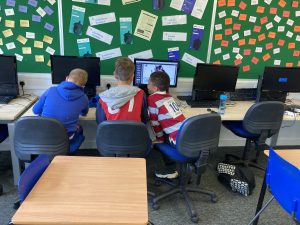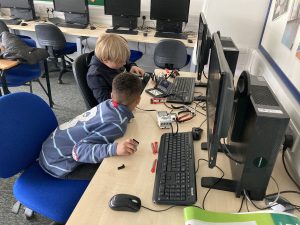Art (5-10 year-olds)
Teacher: Valentin Rusinov
Our classes are art lessons. The main part of each lesson will be devoted to practical exercises, but we will also talk about theory. Separate classes will be devoted to studying the basics of composition, colour science, and perspective. In the course of classes the teacher will acquaint students with the history of art, individual genres, styles and the different schools. In general, with such a comprehensive approach, we hope to show the flexibility and variation of choice and execution of an artistic concept by the artist. Each student will be able to find the technique that is closest to him and in which he can best reveal himself. The teacher follows an individual approach to each student.
About the teacher:
Valentin studied at the art school of St. Francis in Riga. Later he worked as an illustrator in a youth magazine. He worked in interior design. In Cambridge, Valentin completed courses in jewelry. He is fond of photography and photo printing, he also has experience with stage decorations in the theatre.
About the teacher: Valentin studied at the art school of St. Francis in Riga. Later he worked as an illustrator in a youth magazine. He also worked in interior design. In Cambridge, Valentin completed courses in jewelry. He is fond of photography and photo printing, he also has experience with stage decorations in the theatre.
Visual Art (3–5 year-olds)
Teacher: Olga Linova
The syllabus for the youngest learners is especially designed to help them develop their creativity, and encourage good, positive feelings!
Topics include: nature and seasons; decorative patterns; Russian fairy tales, etc.
Aims: we shall extend and consolidate the children’s idea of colour, shape and size.
Materials:
- paint (watercolour, gouache), coloured pencils, felt-tip pens, coloured chalk;
- coloured paper, relief paper (for collages);
- clay, play-dough, plasticine.
Tasks are chosen to take into account the age and also individual strengths of every child.
Advanced gymnastics (5–15 year-olds)
Teacher: Olga Romanova
It aims at girls of ages 11-18 who are currently attending or have attended a gym club in the past, and who are motivated enough to make a warm-up on their own (16.00-16.15) and work intensively during the next 45 minutes. This term we will work with ribbons to present the routine at the Sports Day next term and/or other school events.
(In Russian / описание на русском языке)
Theatre for Young Actors
Teacher: Tatyana Lavrentyeva
If your child has a desire to act and develop their creative side, in order to succeed in life, then the theatre is for them!
The syllabus includes speech training, pronunciation and articulation, work on coordination and harmony of movements, building up self-confidence, relaxed demeanour and artistic zest.
The following will be used during these sessions:
- special techniques and exercises to improve acting skills and the art of speech on stage, which have been developed in theatre schools and colleges of Moscow and London;
- materials for working with texts and mini-shows, based on classic Russian literature, i.e. by such authors as Chekhov, Tolstoy, Turgenev, Gogol, and Pushkin – including prose, poems, fables, and fairy tales.
TRIZ: Theory of inventive problem solving (6–8 year-olds)
Teacher: Olga Pavlenko
Created to solve engineering problems and generate new ideas. The objectives of the TRIZ course for children (classes for ages 6-8) are as follows:
- to train the flexibility of thinking in children, break stereotypes;
- to form and develop creativity useful in training, in personal projects, in everyday life and in relationships with others;
- learning to find multiple solutions;
- to help children reach their potential.
What TRIZ gives a child:
- making it easier and faster to learn the school curriculum;
- mearning to take initiative in school and extracurricular activities;
- defend your opinion and find supportive arguments.
Chess Club
Teacher: TBC
From September, a new Chess Club will open its doors at the Russian School. We welcome players of any level – from beginners to those who have already tried their hand at tournaments. We will enjoy solving chess problems, engage in friendly combat with each other, and explore together the basics of chess strategies.
Piano Lessons
Teacher: Svetlana Boutwood
These are one-to-one lessons for which a proper piano is used. Please see the teacher with any individual queries.
Cost: £14 per 30 min.
“Fun Maths” Club
Teachers: Olga Kalugina and Tatiana Yurasova
From the new academic year, there will be two “Fun Maths Clubs” in the Russian School, for two different age groups: 5–9 year-olds, and 9–13 year-olds, with the potential to also welcome older children if there is enough interest.
The aim of the club is to develop the children’s interest in Maths, introduce them to different “faces” of Mathematics, that are sometimes unfamiliar and surprising, and encourage them to think logically and to tackle skilfully problems that may initially look confusing and even impossible!
In a fun, interactive form, every Saturday we shall set off on an amazing journey – into the mysterious world of numbers, shapes, dimensions, solids, formulae and puzzles. Children will explore Maths around us, and will learn to make up their own Maths problems.
The syllabus will be designed in a flexible way, to reflect the children’s age, interests and potential.
Fun Maths Club
Teacher: Tatiana Ustinova
At the beginning of the new academic year Fun Maths Club opens at the Russian School, to which all children of 4–6 years of age are welcome. The main focus of the club is to develop the children’s interest in Maths, improve their concentration and basic mathematical skills. In a fun, interactive form children will explore Maths around us, and will learn to make up their own Maths problems.
Film Club
Teacher: Suzy Brandes
The main aim of this club is to study Russian language and culture through great works of cinema, from Soviet classics to contemporary films.
Sessions will include viewing selected films, preceded by a short introduction about the film, and followed by discussion. The selection of particular films (from a long list) will be based on children’s interests and priorities.
Занятия по программированию (8 – 12 лет)
Преподаватель: Рихард Путикис
Современные технологии буквально охватили всю нашу планету, они пришли в науку, образование, медицину, психологию, и даже театральное и изобразительное исскуство. Сегодня ни у кого нет сомнений, что наше настоящее и наше будущее неотделимо от высоких технологий. Современные дети с ранних лет проявляют интерес к технике и современным технологиям, и особенно к играм. Занятия по программированию позволяют совместить интерес детей к технике и их тягу к развлечениям. Навык написания программ является отличной базой для освоения современных технологий, а также способствует развитию логического и творческого мышления, поэтому занятия по программированию будут одинаково интересны и увлечённым математикой детям, и «гуманитариям».

Программирование – это творчество, потому что помогает детям при помощи логики реализовывать свои идеи и воплощать в жизнь реальные творческие проекты. Изучение основ программирования позволяет глубже понять математическую логику, познакомиться с основами алгоритмизации, что благотворно влияет на изучение точных наук в школе, и умение решать сложные задачи в различных жизненных ситуациях. Программирование – востребованная профессия. Разработчики программного обеспечения востребованы в самых разных отраслях, от бизнеса до научных и космических программ. Возможность прикоснуться к современной профессии дает возможность ребенку в будущем проще определиться, чем он хотел бы заниматься.
На занятиях, с помощью игр и логических задач дети будут:
1. учиться рассуждать, анализировать и делать выводы;
2. развивать логическое мышление, сообразительность, память, внимание и интеллект;
3. повышать уровень компьютерной грамотности;
4. повышать уровень знаний об устройстве компьютера и его функций;
5. с помощью игр знакомиться с такими понятиями, как закономерности, «истина-ложь», aлгоритмы и функции, ориентирование в пространстве, последовательности и т.д.;
6. получать практические навыки программирования в Scratch;
7. получать практические навыки программирования в Phyton;
8. повышать самооценку и интерес к обучению в школе.
Robotics Club (7-13 year-olds)
Teacher: Rihard Putikis
Let’s learn programming with Lego Mindstorms!
 Pupils will understand how to build models with Lego, how to use sensors to add interactivity and how to control their behaviour. Everyone will get a chance to bring their first robot alive.
Pupils will understand how to build models with Lego, how to use sensors to add interactivity and how to control their behaviour. Everyone will get a chance to bring their first robot alive.